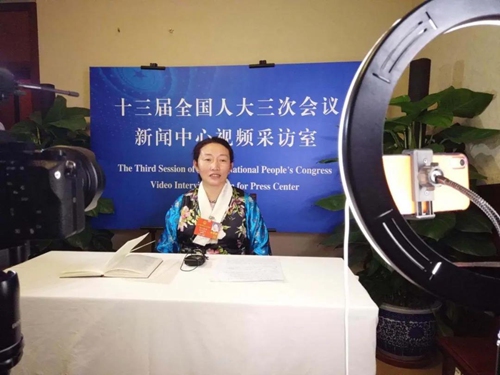
Zeren Yongzong, the deputy to the National People's Congress from Southwest China's Tibet Autonomous Region, is during an online interview Photo: Courtesy of publicity department of the Tibet Autonomous Region
Zeren Yongzong, wearing traditional Tibetan dress, was a bit nervous yet excited when she sat in front of a blue banner on Saturday night.
The deputy to the National People's Congress from Southwest China's Tibet Autonomous Region was ready to have her first online interview for two sessions via a smart phone.
"Where should I look? At you or that camera?" she asked the coordinator.
On another side of the online conference via Tencent Meeting app, a dozen of reporters from different media were ready to put forward questions about the medical care in Tibet, a focus for Yongzong.
Yongzong answered several questions in the following half hour.
It was the first interview the Tibet delegation organized since the Third Session of the 13th National People's Congress (NPC) was opened Friday. It was held in a room specifically set up for video interviews in the Jingxi Hotel where the group lives.
Due to the novel coronavirus epidemic, reports of the two sessions this year are mainly given through internet and remote video, making it the first ever two sessions "on the cloud."
As early as on Wednesday, the first press conference of the 13th National Committee of the Chinese People's Political Consultative Conference (CPPCC) was held through remote video. A screen was set up at the Great Hall of the People in Beijing, where the conference was held, connecting with another screen at the 6.6 kilometer-away Media Center, the press center of the two sessions.
The meetings held on the cloud—breaking the limitation of time and space and realizing the real-time interaction - have broadened the channel of communication, said a China Economic Herald report.
Aside from Tibet delegation, groups from Guangdong and Shandong also have held online interviews, according to media reports. The Jiangsu group even live streamed its meeting to related governmental departments to gather suggestions at any time.
China Unicom provides the technology service for the video system and remote interview, according to cww.net.cn. Hotels for delegations have been covered with 4G/5G signals, according to the report.

